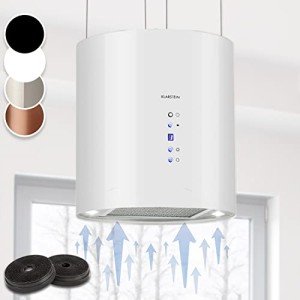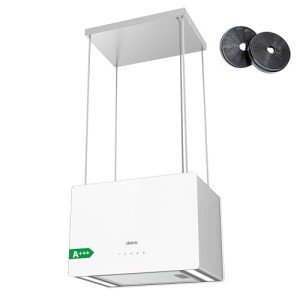The 10 Most Terrifying Things About Extractor Fan For Island
페이지 정보

본문

Extractor Fans for Island Kitchens: An Essential Guide
black island cooker hoods cooking areas are a trademark of modern home style, offering both design and performance. Nevertheless, as beautiful as these kitchen layouts can be, they frequently feature their own set of challenges, especially concerning ventilation. One of the very best services for these challenges depends on the installation of extractor fans. This article serves as a useful guide on extractor fans for island extractor fans kitchens, describing their significance, types, installation elements, and upkeep.
Understanding Extractor Fans
Extractors fans, also known as range hoods or exhaust hoods, are gadgets that help get rid of smoke, steam, heat, grease, and cooking odors from the kitchen. They run by drawing air through filters and venting it outside or recirculating it back into the kitchen.
Value of Extractor Fans in Island Kitchens
island hob cooking areas often lack sufficient ventilation due to the fact that they do not have standard walls to install a range hood on. This can cause pain and possible health risks from inhaling fats, smoke, and odors. Here are a number of reasons extractor fans are essential:
- Improved Air Quality: They help maintain a fresher indoor environment by eliminating pollutants.
- Decreased Heat: Cooking can increase temperature levels; extractor fans assist relieve this by removing hot air.
- Grease Control: Regular use lowers grease accumulation on cabinets and walls, assisting in kitchen upkeep.
- Enhanced Cooking Experience: A well-ventilated kitchen makes cooking more satisfying, allowing chefs to focus on their cooking creations.
Kinds Of Extractor Fans for Island Kitchens
When choosing an extractor fan for an island kitchen, it is very important to think about the numerous types offered. Here are the most common options:
Ducted Extractor extractor fan For island Fans:
- Functionality: These fans vent air outside, using ducts.
- Pros: Highly reliable at eliminating smells and humidity.
- Cons: Installation can be complicated and might need additional structural modifications.
Ductless (Recirculating) Extractor Fans:
- Functionality: These fans filter air and then recirculate it back into the kitchen.
- Pros: Easier to install, as they do not need ductwork.
- Cons: Less effective at removing odors compared to ducted designs.
Downdraft Extractor Fans:
- Functionality: Installed behind the range, they pull smoke downwards and vent it through ducts or filters.
- Pros: Sleek design, ideal for keeping an open kitchen.
- Cons: Effectiveness can be restricted by cooking style and wind direction.
Wall-Mounted Extractor Fans:
- Functionality: While not specifically for islands, some styles can be adjusted for island use.
- Pros: Wide range of designs and sizes readily available.
- Cons: May require longer ducts to reach outside.
Table: Comparison of Extractor Fan Types
| Type | Venting Method | Pros | Cons |
|---|---|---|---|
| Ducted | Outside | Highly reliable at getting rid of smells | Complex installation |
| Ductless | Recirculating | Easy setup | Less efficient at odor elimination |
| Downdraft | Down | Sleek design | Minimal effectiveness |
| Wall-Mounted | Outside | Range of styles | May require extensive ductwork |
Aspects to Consider When Choosing an Extractor Fan
Picking the best extractor fan requires evaluating specific key components:
- Kitchen Size: The larger the kitchen, the more powerful the fan needs to be. The capability is generally determined in cubic feet per minute (CFM).
- Noise Level: Some fans can be rather loud. Choose for models with lower sones (a step of perceived loudness).
- Filter Types: Mesh filters are easy to tidy, while charcoal filters must be changed regularly.
- Design and Aesthetics: Considering that selected fans can be a focal point in an island kitchen, their design must complement the overall aesthetics.
- Spending plan: Prices for extractor fans can vary commonly, so it's important to set a budget that thinks about both purchase and installation expenses.
Setup Tips
Appropriate installation is essential for optimal performance. Here are necessary suggestions:
- Height Consideration: Install the fan 24-30 inches above the cooking surface area for maximum effectiveness.
- Ducting: If using a ducted system, make sure ducts are as short and straight as possible to improve airflow.
- Electrical Considerations: Ensure compliance with regional codes; consider hiring an expert electrical expert if required.
- Availability: Ensure that controls are easily available for everyday use.
Maintenance of Extractor Fans
To guarantee longevity and optimal performance, regular maintenance is needed. Here are some pointers for maintaining extractor fan for island fans:
- Clean Filters Regularly: Depending on usage, filters ought to be cleaned regular monthly or bimonthly.
- Examine Fan Blades: Periodically examine for grease accumulation on the blades and clean as needed.
- Inspect Ducts: Ensure that the ductwork is free from obstructions and clean every 1-2 years.
- Service the Motor: Consider annual servicing of the motor to ensure it runs effectively.
Frequently Asked Questions About Extractor Fans for Island Kitchens
Can I set up an extractor fan myself?
- While some property owners may set up extractor fans themselves, it is suggested to employ a professional for extractor fan For island complex setups, especially for ducted systems.
How do I identify the right CFM for my kitchen?
- A general general rule is to compute 100 CFM for every single direct foot of your cooking surface area. For instance, a 5-foot cooking surface would require a fan with at least 500 CFM.
Are ductless extractor fans efficient?
- Ductless extractor fans can effectively filter out some odors, but they are not as powerful as ducted models for total odor and smoke elimination.
How often should I replace the filters?

- Charcoal filters must be changed every 3-6 months, while metal filters can be washed and reused.
Is the noise level of extractor fans adjustable?
- Lots of modern-day extractor fans featured adjustable fan speeds, permitting users to manage sound levels based on cooking needs.
Selecting the best extractor fan for an island kitchen is a necessary component in keeping a comfortable cooking environment. Understanding the numerous alternatives, their functionality, and upkeep requirements empowers house owners to make informed decisions. Correct setup and upkeep also ensure that these gadgets run effectively, contributing to a cleaner, more pleasant cooking area. By thinking about the information offered in this detailed guide, people can enhance the performance and visual appeal of their island kitchen areas.
- 이전글Why Built In Oven And Microwave Is Still Relevant In 2024 25.05.19
- 다음글A Peek Inside The Secrets Of Where Is The Best Place To Buy Bunk Beds 25.05.19
댓글목록
등록된 댓글이 없습니다.



